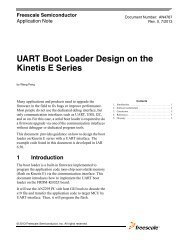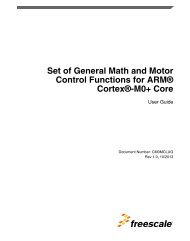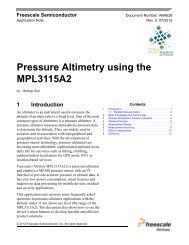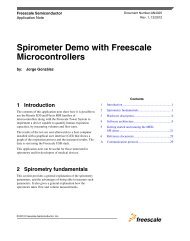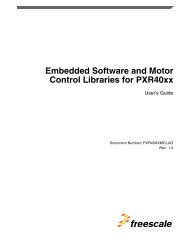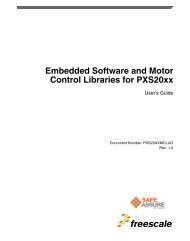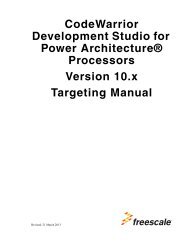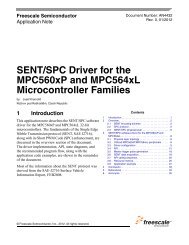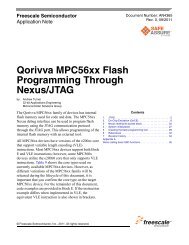CAU and mmCAU API User Guide - Freescale Semiconductor
CAU and mmCAU API User Guide - Freescale Semiconductor
CAU and mmCAU API User Guide - Freescale Semiconductor
Create successful ePaper yourself
Turn your PDF publications into a flip-book with our unique Google optimized e-Paper software.
<strong>Freescale</strong> <strong>Semiconductor</strong> Inc.<br />
Microcontroller Solutions Group<br />
ColdFire/ColdFire+ <strong>CAU</strong> <strong>and</strong><br />
Kinetis mm<strong>CAU</strong> Software Library<br />
<strong>User</strong> <strong>Guide</strong><br />
Rev. 2.3
Contents<br />
1 Purpose .......................................................................................................................................................4<br />
2 Overview.....................................................................................................................................................4<br />
2.1 Library Features..................................................................................................................................................................4<br />
3 Software library details.........................................................................................................................5<br />
3.1 <strong>CAU</strong> <strong>and</strong> mm<strong>CAU</strong> software library overview..........................................................................................................5<br />
3.2 <strong>CAU</strong> <strong>and</strong> mm<strong>CAU</strong> software library usage .................................................................................................................6<br />
3.3 <strong>CAU</strong> <strong>and</strong> mm<strong>CAU</strong> software library application programming interface (<strong>API</strong>) .........................................7<br />
3.3.1 cau_aes_set_key...................................................................................................................................................................................7<br />
3.3.2 cau_aes_encrypt ..................................................................................................................................................................................8<br />
3.3.3 cau_aes_decrypt ..................................................................................................................................................................................9<br />
3.3.4 cau_des_chk_parity ......................................................................................................................................................................... 10<br />
3.3.5 cau_des_encrypt............................................................................................................................................................................... 11<br />
3.3.6 cau_des_decrypt............................................................................................................................................................................... 12<br />
3.3.7 cau_md5_initialize_output........................................................................................................................................................... 13<br />
3.3.8 cau_md5_hash_n .............................................................................................................................................................................. 14<br />
3.3.9 cau_md5_update .............................................................................................................................................................................. 15<br />
3.3.10 cau_md5_hash ................................................................................................................................................................................ 16<br />
3.3.11 cau_sha1_initialize_output........................................................................................................................................................ 17<br />
3.3.12 cau_sha1_hash_n ........................................................................................................................................................................... 18<br />
3.3.13 cau_sha1_update........................................................................................................................................................................... 19<br />
3.3.14 cau_sha1_hash................................................................................................................................................................................ 20<br />
3.3.15 cau_sha256_initialize_output .................................................................................................................................................. 21<br />
3.3.16 cau_sha256_hash_n......................................................................................................................................................................22<br />
3.3.17 cau_sha256_update......................................................................................................................................................................23<br />
3.3.18 cau_sha256_hash .......................................................................................................................................................................... 24<br />
4 Considerations ......................................................................................................................................25<br />
4.1 Problem reporting instructions.................................................................................................................................25<br />
4.2 Considerations <strong>and</strong> references ..................................................................................................................................25<br />
<strong>CAU</strong> <strong>and</strong> mm<strong>CAU</strong> <strong>API</strong> <strong>User</strong> <strong>Guide</strong> Page 2 of 25
Revision History<br />
Revision Author Date Changes<br />
1.0 JPW Feb‐07 Launch release for <strong>CAU</strong> software library<br />
2.0 PA Apr‐11 Updated for mm<strong>CAU</strong> software library<br />
2.1 PA May‐11 Minor fixes<br />
2.2 LS May‐11 <strong>API</strong> minor fixes<br />
2.3 JC, DS, JPW Aug‐11 Document rewording<br />
<strong>CAU</strong> <strong>and</strong> mm<strong>CAU</strong> <strong>API</strong> <strong>User</strong> <strong>Guide</strong> Page 3 of 25
1 Purpose<br />
The following document shows details on how to use the <strong>CAU</strong> <strong>and</strong> mm<strong>CAU</strong> software library in any<br />
application that needs to integrate a cryptographic algorithm or hashing function supported by the<br />
software library. <strong>Freescale</strong> products supported by the software library are ColdFire, ColdFire+ <strong>and</strong><br />
Kinetis MCU/MPUs. Check the specific <strong>Freescale</strong> product for <strong>CAU</strong> <strong>and</strong> mm<strong>CAU</strong> availability.<br />
2 Overview<br />
The ColdFire/ColdFire+ <strong>CAU</strong> (cryptographic acceleration unit) software library is a set of low‐level<br />
cryptographic functions implemented using <strong>CAU</strong> co‐processor instructions. The Kinetis mm<strong>CAU</strong><br />
(memory mapped cryptographic unit) software library uses the mm<strong>CAU</strong> co‐processor that is connected<br />
to the Kinetis ARM Cortex‐M4 Private Peripheral Bus (PPB). During the rest of the document, <strong>CAU</strong><br />
refers to both <strong>CAU</strong> <strong>and</strong> mm<strong>CAU</strong> unless explicitly noted. Also, both software libraries share the same<br />
application programming interface (<strong>API</strong>); both interfaces are referenced as a single definition<br />
throughout the document unless explicitly noted.<br />
2.1 Library Features<br />
The library is as compact <strong>and</strong> generic as possible to simplify integration with existing cryptographic<br />
software. The library has a st<strong>and</strong>ard header file with ANSI C prototypes for all functions. This software<br />
library is thread safe only if <strong>CAU</strong> registers are saved on a context switch. The ColdFire/ColdFire+ <strong>CAU</strong><br />
software library adheres to ColdFire C‐language compiler conventions (ABI) using st<strong>and</strong>ard parameter<br />
passing (stack passing). The Kinetis mm<strong>CAU</strong> software library is also compatible to ARM C compiler<br />
conventions (EABI). Only ColdFire <strong>and</strong> Kinetis devices with the <strong>CAU</strong> or mm<strong>CAU</strong> hardware coprocessors<br />
are supported. For best performance, input <strong>and</strong> output data blocks must be aligned on 0‐modulo‐4<br />
byte addresses.<br />
The <strong>CAU</strong> library supports the following encryption/decryption algorithms <strong>and</strong> hashing functions:<br />
• AES128<br />
• AES192<br />
• AES256<br />
• DES<br />
• 3DES<br />
• MD5<br />
• SHA1<br />
• SHA256<br />
<strong>CAU</strong> <strong>and</strong> mm<strong>CAU</strong> <strong>API</strong> <strong>User</strong> <strong>Guide</strong> Page 4 of 25
Note:<br />
3DES crypto algorithms are supported by calling the corresponding DES crypto function three times.<br />
Hardware support for SHA256 is only present in <strong>CAU</strong> version 2. Go to the appropriate MCU/MPU<br />
reference manual for details of availability. Additionally, the cau_sha256_initialize_output() function<br />
checks the hardware revision <strong>and</strong> returns a (‐1) value if the <strong>CAU</strong> lacks SHA256 support.<br />
3 Software library details<br />
3.1 <strong>CAU</strong> <strong>and</strong> mm<strong>CAU</strong> software library overview<br />
Table 1 shows the crypto algorithms <strong>and</strong> hashing functions included in the software library:<br />
Crypto<br />
Algorithms<br />
Hashing<br />
Functions<br />
AES128<br />
AES192<br />
AES256<br />
DES/3DES<br />
MD5<br />
SHA1<br />
SHA256<br />
cau_aes_set_key<br />
cau_aes_encrypt<br />
cau_aes_decrypt<br />
cau_des_chk_parity<br />
cau_des_encrypt<br />
cau_des_decrypt<br />
cau_md5_initialize_output<br />
cau_md5_hash_n<br />
cau_md5_update<br />
cau_md5_hash<br />
cau_sha1_initialize_output<br />
cau_sha1_hash_n<br />
cau_sha1_update<br />
cau_sha1_hash<br />
cau_sha256_initialize_output<br />
cau_sha256_hash_n<br />
cau_sha256_update<br />
cau_sha256_hash<br />
Table 1: Library Overview<br />
<strong>CAU</strong> <strong>and</strong> mm<strong>CAU</strong> <strong>API</strong> <strong>User</strong> <strong>Guide</strong> Page 5 of 25
3.2 <strong>CAU</strong> <strong>and</strong> mm<strong>CAU</strong> software library usage<br />
The software library contains the following files:<br />
File Description<br />
cau_api.h <strong>CAU</strong> <strong>and</strong> mm<strong>CAU</strong> header file<br />
cau_lib.a <strong>CAU</strong> library: ColdFire/ColdFire+<br />
mmcau_lib.a mm<strong>CAU</strong> library: Kinetis<br />
Table 2: File Description<br />
The header file must be always included in the project. Only cau_lib.a or mmcau_lib.a must be<br />
included in the project depending on <strong>CAU</strong> or mm<strong>CAU</strong> hardware presence.<br />
The header file is shared between <strong>CAU</strong> <strong>and</strong> mm<strong>CAU</strong> software library, but only one of the following C‐<br />
language macros must be defined for the project to include <strong>CAU</strong> or mm<strong>CAU</strong> respectively.<br />
Example:<br />
Macro Description<br />
FREESCALE_<strong>CAU</strong> Using <strong>CAU</strong> software library<br />
FREESCALE_MM<strong>CAU</strong> Using mm<strong>CAU</strong> software library<br />
Table 3: C‐language Macros Description<br />
#define FREESCALE_<strong>CAU</strong> //<strong>CAU</strong> functions are implemented in cau_lib.a library<br />
When using FREESCALE_<strong>CAU</strong> on ColdFire/ColdFire+ products, st<strong>and</strong>ard memory‐based parameter<br />
passing is assumed. This feature assumes arguments are provided to the library functions using the<br />
stack <strong>and</strong> NOT by using CPU registers (register parameter passing). This argument passing format is<br />
required by <strong>Freescale</strong> CodeWarrior compiler. If using another compiler, parameter passing must be<br />
properly selected for argument stack usage.<br />
Note:<br />
For CodeWarrior, by adding the compiler directive __declspec (st<strong>and</strong>ard_abi), a function is forced<br />
to use st<strong>and</strong>ard parameter passing:<br />
__declspec (st<strong>and</strong>ard_abi)<br />
void<br />
cau_aes_set_key (const unsigned char *key, const int key_size, unsigned char<br />
*key_sch);<br />
<strong>CAU</strong> <strong>and</strong> mm<strong>CAU</strong> <strong>API</strong> <strong>User</strong> <strong>Guide</strong> Page 6 of 25
3.3 <strong>CAU</strong> <strong>and</strong> mm<strong>CAU</strong> software library application programming<br />
interface (<strong>API</strong>)<br />
The library includes the following functions which are valid for <strong>CAU</strong> <strong>and</strong> mm<strong>CAU</strong> software libraries:<br />
3.3.1 cau_aes_set_key<br />
AES: Performs an AES key expansion.<br />
Prototype:<br />
void<br />
cau_aes_set_key(const unsigned char *key,<br />
const int key_size,<br />
unsigned char *key_sch<br />
)<br />
Parameters:<br />
[in] *key pointer to input key (128, 192, 256 bits in length)<br />
[in] key_size key size in bits (128, 192, 256)<br />
[out] *key_sch pointer to key schedule output (44, 52, 60 longwords)<br />
Returns:<br />
None<br />
Notes:<br />
Table 4 shows the requirements for the cau_aes_set_key() function when using AES128, AES192 or<br />
AES256.<br />
AES cau_aes_set_key()<br />
[in] Block Size (bits) [out] Key Schedule Size (32‐bit data values)<br />
128 44<br />
192 52<br />
256 60<br />
Table 4: AES set_key Requirements<br />
<strong>CAU</strong> <strong>and</strong> mm<strong>CAU</strong> <strong>API</strong> <strong>User</strong> <strong>Guide</strong> Page 7 of 25
3.3.2 cau_aes_encrypt<br />
AES: Encrypts a single 16‐byte block for AES128, AES192 or AES256<br />
Prototype:<br />
void<br />
cau_aes_encrypt (const unsigned char *in,<br />
const unsigned char *key_sch,<br />
const int nr,<br />
unsigned char *out<br />
)<br />
Parameters:<br />
[in] *in pointer to 16‐byte block of input plaintext<br />
[in] *key_sch pointer to key schedule (44, 52, 60 longwords)<br />
[in] nr number of AES rounds (10, 12, 14 = f(key_schedule))<br />
[out] *out pointer to 16‐byte block of output ciphertext<br />
Returns:<br />
None<br />
Notes:<br />
Input <strong>and</strong> output blocks may overlap.<br />
Table 5 shows the requirements for the cau_aes_encrypt()/cau_aes_decrypt() function when using<br />
AES128, AES192 or AES256.<br />
AES cau_aes_encrypt()/cau_aes_decrypt()<br />
Block Cipher [in] Key Schedule Size (longwords) [in] Number of AES rounds<br />
AES128 44 10<br />
AES192 52 12<br />
AES256 60 14<br />
Table 5: AES Encryption Requirements<br />
<strong>CAU</strong> <strong>and</strong> mm<strong>CAU</strong> <strong>API</strong> <strong>User</strong> <strong>Guide</strong> Page 8 of 25
3.3.3 cau_aes_decrypt<br />
AES: Decrypts a single 16‐byte block for AES128, AES192 <strong>and</strong> AES256<br />
Prototype:<br />
void<br />
cau_aes_decrypt (const unsigned char *in,<br />
const unsigned char *key_sch,<br />
const int nr,<br />
unsigned char *out<br />
)<br />
Parameters:<br />
[in] *in pointer to 16‐byte block of input ciphertext<br />
[in] *key_sch pointer to key schedule (44, 52, 60 longwords)<br />
[in] nr number of AES rounds (10, 12, 14 = f(key_schedule))<br />
[out] *out pointer to 16‐byte block of output plaintext<br />
Returns:<br />
None<br />
Notes:<br />
Input <strong>and</strong> output blocks may overlap.<br />
Table 6 shows the requirements for the cau_aes_encrypt()/cau_aes_decrypt() function when using<br />
AES128, AES192 or AES256.<br />
AES cau_aes_encrypt()/cau_aes_decrypt()<br />
Block [in] Key Schedule Size [in] Number of AES<br />
Cypher<br />
(longwords)<br />
rounds<br />
AES128 44 10<br />
AES192 52 12<br />
AES256 60 14<br />
Table 6: AES Decryption Requirements<br />
<strong>CAU</strong> <strong>and</strong> mm<strong>CAU</strong> <strong>API</strong> <strong>User</strong> <strong>Guide</strong> Page 9 of 25
3.3.4 cau_des_chk_parity<br />
DES: Checks key parity<br />
Prototype:<br />
int<br />
cau_des_chk_parity (const unsigned char *key<br />
)<br />
Parameters:<br />
[in] *key pointer to 64‐bit DES key with parity bits<br />
Returns:<br />
0 no error<br />
-1 parity error<br />
Notes:<br />
None<br />
<strong>CAU</strong> <strong>and</strong> mm<strong>CAU</strong> <strong>API</strong> <strong>User</strong> <strong>Guide</strong> Page 10 of 25
3.3.5 cau_des_encrypt<br />
DES: Encrypts a single 8‐byte block<br />
Prototype:<br />
void<br />
cau_des_encrypt (const unsigned char *in,<br />
const unsigned char *key,<br />
unsigned char *out<br />
)<br />
Parameters:<br />
[in] *in pointer to 8‐byte block of input plaintext<br />
[in] *key pointer to 64‐bit DES key with parity bits<br />
[out] *out pointer to 8‐byte block of output ciphertext<br />
Returns:<br />
None<br />
Notes:<br />
Input <strong>and</strong> output blocks may overlap.<br />
<strong>CAU</strong> <strong>and</strong> mm<strong>CAU</strong> <strong>API</strong> <strong>User</strong> <strong>Guide</strong> Page 11 of 25
3.3.6 cau_des_decrypt<br />
DES: Decrypts a single 8‐byte block<br />
Prototype:<br />
void<br />
cau_des_decrypt (const unsigned char *in,<br />
const unsigned char *key,<br />
unsigned char *out<br />
)<br />
Parameters:<br />
[in] *in pointer to 8‐byte block of input ciphertext<br />
[in] *key pointer to 64‐bit DES key with parity bits<br />
[out] *out pointer to 8‐byte block of output plaintext<br />
Returns:<br />
None<br />
Notes:<br />
Input <strong>and</strong> output blocks may overlap.<br />
<strong>CAU</strong> <strong>and</strong> mm<strong>CAU</strong> <strong>API</strong> <strong>User</strong> <strong>Guide</strong> Page 12 of 25
3.3.7 cau_md5_initialize_output<br />
MD5: Initializes the MD5 state variables<br />
Prototype:<br />
void<br />
cau_md5_initialize_output (const unsigned char *md5_state<br />
)<br />
Parameters:<br />
[out] *md5_state pointer to 120‐bit block of md5 state variables: a,b,c,d<br />
Returns:<br />
None<br />
Notes:<br />
None<br />
<strong>CAU</strong> <strong>and</strong> mm<strong>CAU</strong> <strong>API</strong> <strong>User</strong> <strong>Guide</strong> Page 13 of 25
3.3.8 cau_md5_hash_n<br />
MD5: Updates MD5 state variables for one or more input message blocks<br />
Prototype:<br />
void<br />
cau_md5_hash_n (const unsigned char *msg_data,<br />
const int num_blks,<br />
unsigned char *md5_state<br />
)<br />
Parameters:<br />
[in] *msg_data pointer to start of input message data<br />
[in] num_blks number of 512‐bit blocks to process<br />
[in,out] *md5_state pointer to 128‐bit block of MD5 state variables: a,b,c,d<br />
Returns:<br />
None<br />
Notes:<br />
Input message <strong>and</strong> digest output blocks must not overlap.<br />
The cau_md5_initialize_output() function must be called first.<br />
Useful when h<strong>and</strong>ling non‐contiguous input message blocks.<br />
<strong>CAU</strong> <strong>and</strong> mm<strong>CAU</strong> <strong>API</strong> <strong>User</strong> <strong>Guide</strong> Page 14 of 25
3.3.9 cau_md5_update<br />
MD5: Updates MD5 state variables for one or more input message blocks<br />
Prototype:<br />
void<br />
cau_md5_update (const unsigned char *msg_data,<br />
const int num_blks,<br />
unsigned char *md5_state<br />
)<br />
Parameters:<br />
[in] *msg_data pointer to start of input message data<br />
[in] num_blks number of 512‐bit blocks to process<br />
[in,out] *md5_state pointer to 128‐bit block of MD5 state variables: a,b,c,d<br />
Returns:<br />
None<br />
Notes:<br />
Input message <strong>and</strong> digest output blocks must not overlap.<br />
The cau_md5_initialize_output() function is not required.<br />
All input message blocks must be contiguous.<br />
<strong>CAU</strong> <strong>and</strong> mm<strong>CAU</strong> <strong>API</strong> <strong>User</strong> <strong>Guide</strong> Page 15 of 25
3.3.10 cau_md5_hash<br />
MD5: Performs MD5 hash algorithm for a single input message block<br />
Prototype:<br />
void<br />
cau_md5_hash (const unsigned char *msg_data,<br />
unsigned char *md5_state<br />
)<br />
Parameters:<br />
[in] *msg_data pointer to start of input message data<br />
[in,out] *md5_state pointer to 128‐bit block of MD5 state variables: a,b,c,d<br />
Returns:<br />
None<br />
Notes:<br />
Input message <strong>and</strong> digest output blocks must not overlap.<br />
The cau_md5_initialize_output() function must be called first.<br />
Only works for a single input message block.<br />
<strong>CAU</strong> <strong>and</strong> mm<strong>CAU</strong> <strong>API</strong> <strong>User</strong> <strong>Guide</strong> Page 16 of 25
3.3.11 cau_sha1_initialize_output<br />
SHA1: Initializes the SHA1 state variables<br />
Prototype:<br />
void<br />
cau_sha1_initialize_output (const unsigned int *sha1_state<br />
)<br />
Parameters:<br />
[out] *sha1_state pointer to 160‐bit block of SHA1 state variables: a,b,c,d,e<br />
Returns:<br />
None<br />
Notes:<br />
None<br />
<strong>CAU</strong> <strong>and</strong> mm<strong>CAU</strong> <strong>API</strong> <strong>User</strong> <strong>Guide</strong> Page 17 of 25
3.3.12 cau_sha1_hash_n<br />
SHA1: Perform the hash <strong>and</strong> generate SHA1 state variables for one or more input message blocks<br />
Prototype:<br />
void<br />
cau_sha1_hash_n (const unsigned char *msg_data,<br />
const int num_blks,<br />
unsigned int *sha1_state<br />
)<br />
Parameters:<br />
[in] *msg_data pointer to start of input message data<br />
[in] num_blks number of 512‐bit blocks to process<br />
[in,out] *sha1_state pointer to 160‐bit block of SHA1 state variables: a,b,c,d,e<br />
Returns:<br />
None<br />
Notes:<br />
Input message <strong>and</strong> digest output blocks must not overlap.<br />
The cau_sha1_initialize_output() function must be called first.<br />
Useful when h<strong>and</strong>ling non‐contiguous input message blocks.<br />
<strong>CAU</strong> <strong>and</strong> mm<strong>CAU</strong> <strong>API</strong> <strong>User</strong> <strong>Guide</strong> Page 18 of 25
3.3.13 cau_sha1_update<br />
SHA1: Updates SHA1 state variables for one or more input message blocks arguments<br />
Prototype:<br />
void<br />
cau_sha1_update (const unsigned char *msg_data,<br />
const int num_blks,<br />
unsigned int *sha1_state<br />
)<br />
Parameters:<br />
[in] *msg_data pointer to start of input message data<br />
[in] num_blks number of 512‐bit blocks to process<br />
[out] *sha1_state pointer to 160‐bit block of SHA1 state variables: a,b,c,d,e<br />
Returns:<br />
None<br />
Notes:<br />
Input message <strong>and</strong> digest output blocks must not overlap.<br />
The cau_sha1_initialize_output() function is not required.<br />
All input message blocks must be contiguous.<br />
<strong>CAU</strong> <strong>and</strong> mm<strong>CAU</strong> <strong>API</strong> <strong>User</strong> <strong>Guide</strong> Page 19 of 25
3.3.14 cau_sha1_hash<br />
SHA1: Performs SHA1 hash algorithm on a single input message block<br />
Prototype:<br />
void<br />
cau_sha1_hash (const unsigned char *msg_data,<br />
unsigned int *sha1_state<br />
)<br />
Parameters:<br />
[in] *msg_data pointer to start of input message data<br />
[in,out] *sha1_state pointer to 160‐bit block of SHA1 state variables: a,b,c,d,e<br />
Returns:<br />
None<br />
Notes:<br />
Input message <strong>and</strong> digest output blocks must not overlap.<br />
The cau_sha1_initialize_output() function must be called first.<br />
Only works for a single input message block.<br />
<strong>CAU</strong> <strong>and</strong> mm<strong>CAU</strong> <strong>API</strong> <strong>User</strong> <strong>Guide</strong> Page 20 of 25
3.3.15 cau_sha256_initialize_output<br />
SHA256: Initializes the hash output <strong>and</strong> checks the <strong>CAU</strong> hardware revision<br />
Prototype:<br />
int<br />
cau_sha256_initialize_output (const unsigned int *output<br />
)<br />
Parameters:<br />
[out] *output pointer to 256‐bit message digest output<br />
Returns:<br />
0 No error. <strong>CAU</strong>2 hardware present. SHA256 HW support available<br />
-1 Error. <strong>CAU</strong>2 hardware not present. No SHA256 HW support available<br />
Notes:<br />
None<br />
<strong>CAU</strong> <strong>and</strong> mm<strong>CAU</strong> <strong>API</strong> <strong>User</strong> <strong>Guide</strong> Page 21 of 25
3.3.16 cau_sha256_hash_n<br />
SHA256: Updates SHA256 digest output for one or more message block arguments<br />
Prototype:<br />
void<br />
cau_sha256_hash_n (const unsigned char *input,<br />
const int num_blks,<br />
unsigned int *output<br />
)<br />
Parameters:<br />
[in] *input pointer to start of input message<br />
[in] num_blks number of 512‐bit blocks to process<br />
[in,out] *output pointer to 256‐bit message digest output<br />
Returns:<br />
None<br />
Notes:<br />
Input message <strong>and</strong> digest output blocks must not overlap.<br />
The cau_sha256_initialize_output() function must be called first.<br />
Useful when h<strong>and</strong>ling non‐contiguous input message blocks.<br />
<strong>CAU</strong> <strong>and</strong> mm<strong>CAU</strong> <strong>API</strong> <strong>User</strong> <strong>Guide</strong> Page 22 of 25
3.3.17 cau_sha256_update<br />
SHA256: Updates SHA256 state variables for one or more input message blocks arguments<br />
Prototype:<br />
void<br />
cau_sha256_update (const unsigned char *input,<br />
const int num_blks,<br />
unsigned int *output<br />
)<br />
Parameters:<br />
[in] *input pointer to start of input message data<br />
[in] num_blks number of 512‐bit blocks to process<br />
[out] *output pointer to 256‐bit message digest output<br />
Returns:<br />
None<br />
Notes:<br />
Input message <strong>and</strong> digest output blocks must not overlap.<br />
The cau_sha256_initialize_output() function is not required.<br />
All input message blocks must be contiguous.<br />
<strong>CAU</strong> <strong>and</strong> mm<strong>CAU</strong> <strong>API</strong> <strong>User</strong> <strong>Guide</strong> Page 23 of 25
3.3.18 cau_sha256_hash<br />
SHA256: Performs SHA256 hash algorithm for a single input message block<br />
Prototype:<br />
void<br />
cau_sha256_hash (const unsigned char *input,<br />
unsigned int *output<br />
)<br />
Parameters:<br />
[in] *input pointer to start of input message data<br />
[in,out] *output pointer to 256‐bit message digest output<br />
Returns:<br />
None<br />
Notes:<br />
Input message <strong>and</strong> digest output blocks must not overlap.<br />
The cau_sha256_initialize_output() function must be called first.<br />
Only works for a single input message block.<br />
<strong>CAU</strong> <strong>and</strong> mm<strong>CAU</strong> <strong>API</strong> <strong>User</strong> <strong>Guide</strong> Page 24 of 25
4 Considerations<br />
4.1 Problem reporting instructions<br />
Issues <strong>and</strong> suggestions about this document <strong>and</strong> software should be provided through the support web<br />
page at www.freescale.com/support.<br />
4.2 Considerations <strong>and</strong> references<br />
• <strong>CAU</strong> <strong>and</strong> mm<strong>CAU</strong> software libraries require the presence in hardware of <strong>CAU</strong> or mm<strong>CAU</strong><br />
respectively.<br />
• Review your target MCU/MPU for <strong>CAU</strong> or mm<strong>CAU</strong> availability.<br />
• For examples on how to use <strong>CAU</strong> <strong>and</strong> mm<strong>CAU</strong> software libraries, review AN4307<br />
• <strong>Freescale</strong> NanoSSL <strong>and</strong> NanoSSH low level crypto/hashing drivers use <strong>CAU</strong> <strong>and</strong> mm<strong>CAU</strong><br />
software library. Details at www.freescale.com/nanossl <strong>and</strong> www.freescale.com/nanossh.<br />
• <strong>Freescale</strong> <strong>Semiconductor</strong>, Inc. operates in accordance with United States export control laws<br />
<strong>and</strong> regulations <strong>and</strong> such other U.S. <strong>and</strong> other national laws as may apply. Download <strong>CAU</strong> <strong>and</strong><br />
mm<strong>CAU</strong> libraries (<strong>CAU</strong>_MM<strong>CAU</strong>_SW.zip) from www.freescale.com by filling export control<br />
online form.<br />
<strong>CAU</strong> <strong>and</strong> mm<strong>CAU</strong> <strong>API</strong> <strong>User</strong> <strong>Guide</strong> Page 25 of 25


